either和too和also和so的区别
also的用法also,too,either,as,well的区别_as well too also
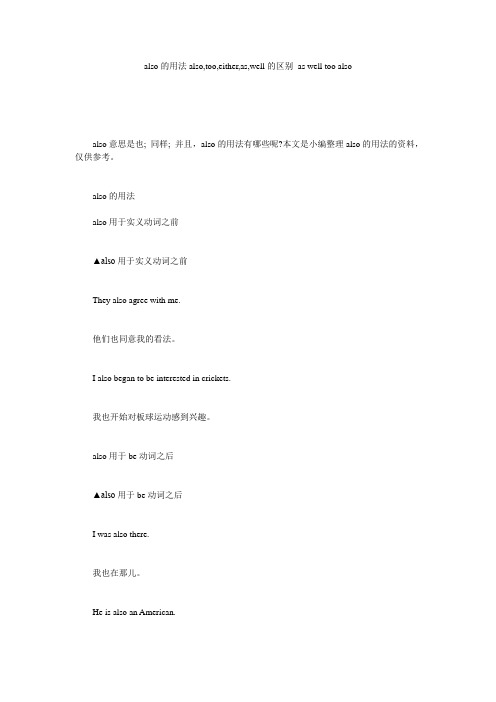
also的用法also,too,either,as,well的区别_as well too alsoalso意思是也; 同样; 并且,also的用法有哪些呢?本文是小编整理also的用法的资料,仅供参考。
also的用法also用于实义动词之前▲also用于实义动词之前They also agree with me.他们也同意我的看法。
I also began to be interested in crickets.我也开始对板球运动感到兴趣。
also用于be动词之后▲also用于be动词之后I was also there.我也在那儿。
He is also an American.他也是美国人。
also用于第一个助动词之后▲also用于第一个助动词之后His sister has also gone to town.他的妹妹也到镇里去了。
The leisure center has also proved uneconomic.休闲中心业已证明利润不大。
also有时放在句首▲also有时放在句子的最前Also, some students were tempted to add written comment of their own throughout the paper. 一些学生也冒险通过论文写出他们自己的评论。
I thought it was the perfect answer. Also, Tony and I had never done a historical subject.我认为它是完美的答案。
而且,托尼和我从没有作过历史科目。
also不能放在句末▲注意:also一定不能放在句子的最后。
参见:《柯林斯COBUILD英语用法词典》但是赵振才教授在他的《英语常见问题解答大词典》中列举了美国英语关于also放在句末的例子。
I must buy some bread also.我还必须买一些面包。
中学英语中的几个“也”
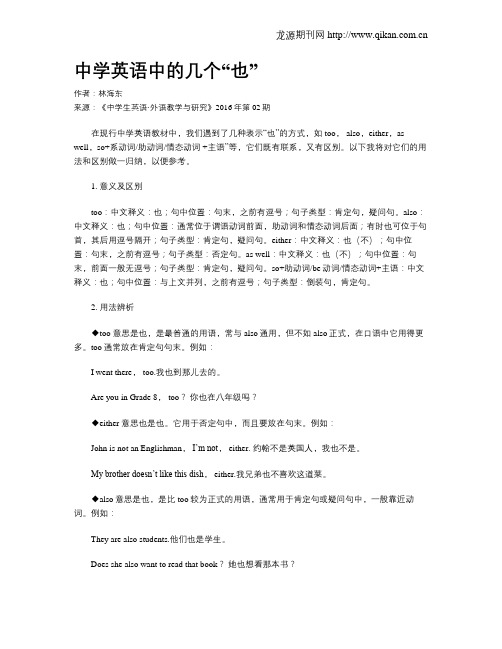
中学英语中的几个“也”作者:林海东来源:《中学生英语·外语教学与研究》2016年第02期在现行中学英语教材中,我们遇到了几种表示“也”的方式,如too, also,either,as well,so+系动词/助动词/情态动词 +主语”等,它们既有联系,又有区别。
以下我将对它们的用法和区别做一归纳,以便参考。
1. 意义及区别too:中文释义:也;句中位置:句末,之前有逗号;句子类型:肯定句,疑问句。
also:中文释义:也;句中位置:通常位于谓语动词前面,助动词和情态动词后面;有时也可位于句首,其后用逗号隔开;句子类型:肯定句,疑问句。
either:中文释义:也(不);句中位置:句末,之前有逗号;句子类型:否定句。
as well:中文释义:也(不);句中位置:句末,前面一般无逗号;句子类型:肯定句,疑问句。
so+助动词/be动词/情态动词+主语:中文释义:也;句中位置:与上文并列,之前有逗号;句子类型:倒装句,肯定句。
2. 用法辨析◆too 意思是也,是最普通的用语,常与also通用,但不如also正式,在口语中它用得更多。
too通常放在肯定句句末。
例如:I went there, too.我也到那儿去的。
Are you in Grade 8, too?你也在八年级吗?◆either 意思也是也。
它用于否定句中,而且要放在句末。
例如:John is not an Englishman,I’m not, either. 约翰不是英国人,我也不是。
My brother doesn’t like this dish, either.我兄弟也不喜欢这道菜。
◆also意思是也,是比too较为正式的用语,通常用于肯定句或疑问句中,一般靠近动词。
例如:They are also students.他们也是学生。
Does she also want to read that book?她也想看那本书?◆ as well是副词短语,常用作状语,其义为“也”,相当于too,它一般放在句末,无须用逗号与句子分开。
too和either的区别
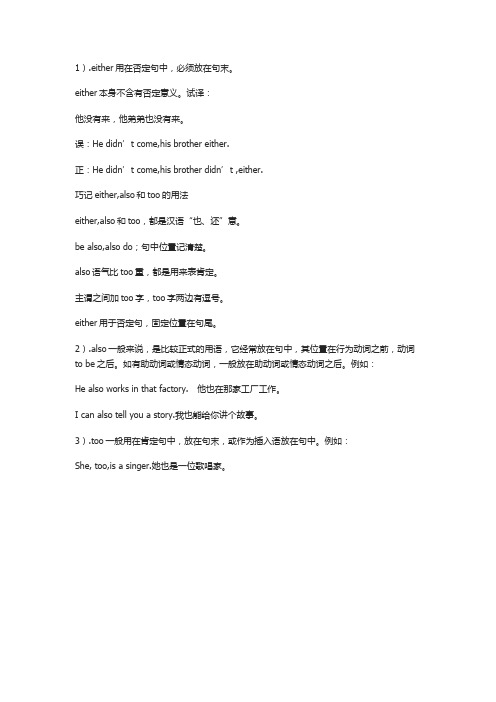
1).either用在否定句中,必须放在句末。
either本身不含有否定意义。
试译:
他没有来,他弟弟也没有来。
误:He didn’t come,his brother either.
正:He didn’t come,his brother didn’t ,either.
巧记either,also和too的用法
either,also和too,都是汉语“也、还”意。
be also,also do;句中位置记清楚。
also语气比too重,都是用来表肯定。
主谓之间加too字,too字两边有逗号。
either用于否定句,固定位置在句尾。
2).also一般来说,是比较正式的用语,它经常放在句中,其位置在行为动词之前,动词to be之后。
如有助动词或情态动词,一般放在助动词或情态动词之后。
例如:
He also works in that factory. 他也在那家工厂工作。
I can also tell you a story.我也能给你讲个故事。
3).too一般用在肯定句中,放在句末,或作为插入语放在句中。
例如:
She, too,is a singer.她也是一位歌唱家。
alsotooeither的使用区别
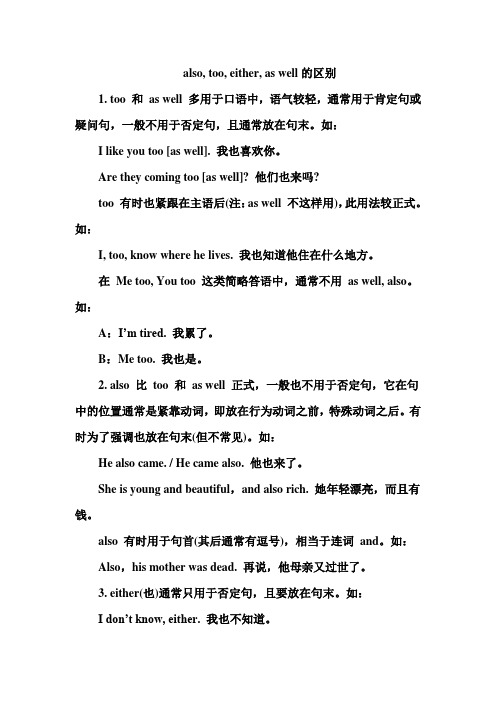
also, too, either, as well的区别1. too 和as well 多用于口语中,语气较轻,通常用于肯定句或疑问句,一般不用于否定句,且通常放在句末。
如:I like you too [as well]. 我也喜欢你。
Are they coming too [as well]? 他们也来吗?too 有时也紧跟在主语后(注:as well 不这样用),此用法较正式。
如:I, too, know where he lives. 我也知道他住在什么地方。
在Me too, You too 这类简略答语中,通常不用as well, also。
如:A:I’m tired. 我累了。
B:Me too. 我也是。
2. also 比too 和as well 正式,一般也不用于否定句,它在句中的位置通常是紧靠动词,即放在行为动词之前,特殊动词之后。
有时为了强调也放在句末(但不常见)。
如:He also came. / He came also. 他也来了。
She is young and beautiful,and also rich. 她年轻漂亮,而且有钱。
also 有时用于句首(其后通常有逗号),相当于连词and。
如:Also,his mother was dead. 再说,他母亲又过世了。
3. either(也)通常只用于否定句,且要放在句末。
如:I don’t know, either. 我也不知道。
He hasn’t finished it,either. 他也还没有做完。
注:有时在肯定句之后跟一个否定句,可能用too,also。
如:He came, but she didn’t also came. 他来了,但她没有也一起来。
He went to Washington, but not to New York too. 他去了华盛顿,但并不是也去了纽约。
比较:He didn’t buy a computer, and she didn’t either. 他没有买电脑,她也没有买。
【英语知识点】too also either的区别
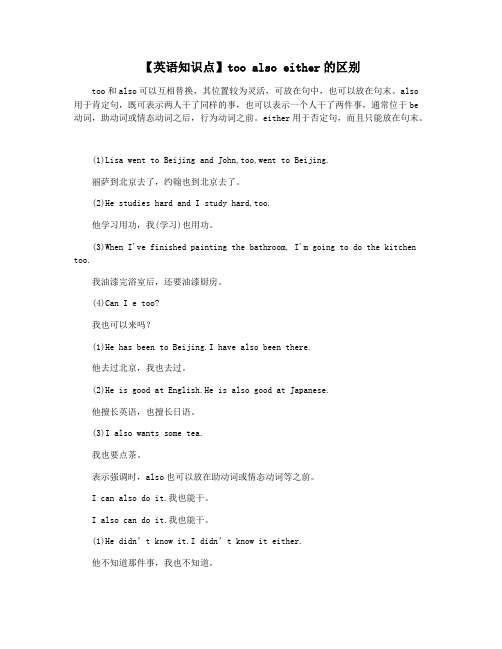
【英语知识点】too also either的区别too和also可以互相替换,其位置较为灵活,可放在句中,也可以放在句末。
also 用于肯定句,既可表示两人干了同样的事,也可以表示一个人干了两件事,通常位于be 动词,助动词或情态动词之后,行为动词之前。
either用于否定句,而且只能放在句末。
(1)Lisa went to Beijing and John,too,went to Beijing.丽萨到北京去了,约翰也到北京去了。
(2)He studies hard and I study hard,too.他学习用功,我(学习)也用功。
(3)When I've finished painting the bathroom, I'm going to do the kitchen too.我油漆完浴室后,还要油漆厨房。
(4)Can I e too?我也可以来吗?(1)He has been to Beijing.I have also been there.他去过北京,我也去过。
(2)He is good at English.He is also good at Japanese.他擅长英语,也擅长日语。
(3)I also wants some tea.我也要点茶。
表示强调时,also也可以放在助动词或情态动词等之前。
I can also do it.我也能干。
I also can do it.我也能干。
(1)He didn’t know it.I didn’t know i t either.他不知道那件事,我也不知道。
(2)I can’t speak French and can’t write it,either.我不会讲法语,也不会写法语。
(3)He did not even say anything to her, and she did not speak to him either.他甚至一句话也没跟她说,她也没跟他说话。
as well, so neither, also ,either, too

as well (as), also, either, too, neither, so 专题3.1 also(比较正式)用于肯定句(疑问句),既可表示两人干了同样的事,也可表示一个人干了两件事,通常位于be动词,助动词或情态动词之后,行为动词之前。
如:(句中)He has been to Beijing. I have also been there.他去过北京,我也去过。
He is good at English. He is also good at Japanese.他擅长英语,也擅长日语。
I also wants some tea.我也要点茶。
注意:表示强调时,also也可放在助动词或情态动词等之前。
比较:I can also do it.我也能干。
I also can do it.(同上)3.2 too也用于肯定句(疑问句),比also更通俗,和also, as well可以相互替换,一般放在句末,也可放在句中。
如:Xiao Li went to Beijing and Xiao Zhao, too, went to Beijing.小李到北京去了,小赵也到北京去了。
He studies hard and I study hard, too.他学习用功,我(学习)也用功。
3.3either用于否定句,而且只能放在句末。
它表示两者中的否定“也”。
如:He didn’t know it. I didn’t know it either.他不知道那件事,我也不知道。
I can’t speak French and can’t write it, either.我不会讲法语,也不会写法语。
3.4 as well也用于肯定句(疑问句),在口语中用得很多,用法和too完全一样,可以互换,通常位于句末。
[见as well, as well as条]。
如:She not only sings, she plays the piano as well.她不但会唱歌,而且会弹钢琴。
too also either neither的区别

too also either neither的区别摘要:1.介绍too、also、either和neither的含义和用途2.分析too和also的异同3.探讨either和neither在用法上的区别4.总结四个词的适用场景和注意事项正文:在日常英语写作和口语中,too、also、either和neither这四个词经常被混淆。
下面我们将逐一解析这些词的含义、用法以及它们之间的区别。
首先,too和also都表示“也”,用于强调某人或某物也具有某种特征或行为。
然而,它们的用法略有不同。
too通常放在句尾,表示对前面所述内容的补充,而also可以放在句子的任何位置。
例如:1.She is a talented artist.-> She is also a talented writer.(她也是一个有才华的作家。
)2.I like reading.-> I also like playing chess.(我也喜欢下棋。
)接下来,我们来看看either和neither。
这两个词主要用于表达选择和排除。
either表示“(两者之中)任何一个”,常用于肯定句中;而neither表示“(两者都不)”,用于否定句中。
例如:1.You can choose either this book or that one.(你可以选择这本书或那本书。
)2.I don"t like neither of the movies.(我不喜欢这两部电影中的任何一部。
)在使用这四个词时,请注意以下几点:1.too和also可用于肯定句,但too需放在句尾;2.either和neither用于选择和排除,either表示“任何一个”,neither 表示“都不”;3.either可以单独使用,而neither需要与not连用;4.避免在一个句子中同时使用too和either,以免造成混淆。
总之,掌握too、also、either和neither这四个词的含义和用法,有助于提高我们的英语表达能力。
tooeitheralso的用法和区别

tooeitheralso的用法和区别"Too", "either"和"also"都是英语中常见的副词,它们在句子中有着不同的用法和含义。
1. "Too" (也/太):- 当"too"用于表示也时,它可以放在句子中一个肯定句的末尾,用来加强陈述。
例如:I like pizza too.(我也喜欢披萨。
)- 当"too"用于表示过度的意思时,它通常放在形容词或副词的前面,用来描述一些事物的程度超过了正常或期望的范围。
例如:The coffee is too hot to drink.(咖啡太烫了,无法喝。
)- "too"也可以用在肯定句的前面,表示"也"。
此时,句子中常使用倒装结构。
例如:Too difficult is the problem for me to solve.(对我来说这个问题也太难了。
)- "too"可以作为连词,引导结果状语从句,表示一个结果使一些行为变得困难或不可能。
例如:She overslept, too, which made her arrive late to work.(她也睡过头了,这使她上班迟到了。
)2. "Either" (也/两者之一):- "either"表示在两个或多个人、物或观点中的一个。
例如:You can choose either red or blue.(你可以选择红色或蓝色。
)- "either"可以放在句子中一个否定句的末尾,表示"也"。
例如:I don't like coffee either.(我也不喜欢咖啡。
)- "either"也可以引导让步状语从句,表示出乎意料的结果。
also,too,either,neither,so,as well的用法

also,too,either,neither,so,as well的用法1.also副词“也,而且,并且”用于肯定句或疑问句,但一般位于句中,通常位于be动词,助动词或情态动词之后,行为动词之前。
如:He has been to Beijing. I have also been there.他去过北京,我也去过。
He is good at English. He is also good at Japanese.他擅长英语,也擅长日语。
We are also students.我们也是学生。
He also went there on foot.他也是走着去的。
Did you also want to have a look? 你也想看看吗?I also want some tea.我也要点茶。
2.too副词表示“也”,常用于肯定句或疑问,常和also相互替换,一般放在句末。
如:He studies hard and I study hard, too.他学习用功,我(学习)也用功。
He likes China, too.他也喜欢中国。
Are you in Grade 3, too? 你也在三年级吗?3. either①副词,“也不”用于否定句,而且只能放在句末。
如:He didn’t know it.I didn’t know it either.他不知道那件事,我也不知道。
She is not a Japanese, I’m not, either.她不是日本人,我也不是。
My sister doesn’t like this song, either.我妹妹也不喜欢这首歌。
②代词,两个中任意一个,(两者之)每一个,故作主语时谓语动词用单数。
如:Either of the books is new.这两本书任何一本都是新的.She doesn’t like either of the films.这两部电影她都不喜欢.③形容词, 用来修饰单数名词,意思与作代词时相同.如:Either school is near my home. (这两所学校中的)任何一所学校都离我家很近.Either question is difficult.两个问题(中的任何一个)都难.There are many flowers on either side of the street.街道两旁有许多的花。
“also”与“too”的区别和用法,别再混淆了!

“also”与“too”的区别和用法,别再混淆了!“also”和“too”在英语中都是副词,用来表示“也”的意思,但它们在用法上存在一些微妙的差异。
以下是它们的主要区别和用法:1、位置差异:“also”通常出现在句子中间,紧挨着谓语动词,或者出现在句首,后面跟着be动词、助动词或情态动词。
“too”则通常出现在句子末尾,或者紧挨着它所修饰的形容词或副词。
2、用法差异:“also”可以用于句首、句中或句尾,但通常不用于否定句。
例如:“Also, I have a cat.”(另外,我也有一只猫。
)“too”在口语中更为常见,通常用于肯定句的句尾,表示“也”的意思。
例如:“I have a dog, and my sister has a dog too.”(我有一只狗,我姐姐也有一只狗。
)3、强调程度:“also”通常用于正式场合,语气较为中性,不太强调“也”的含义。
“too”在口语中有时可以强调“也”的含义,暗示某种出乎意料或惊讶的情感。
以下是一些示例,以帮助您更好地理解“also”和“too”的区别:使用“also”:“I enjoy reading books, and I also like watching movies.”(我喜欢阅读书籍,我也喜欢看电影。
)使用“too”:“I enjoy reading books, and my brother likes watching movies too.”(我喜欢阅读书籍,我的兄弟也喜欢看电影。
)总之,“also”和“too”都表示“也”的意思,但在位置、用法和强调程度上存在微妙的差异。
在使用时,请根据上下文和语境选择合适的副词。
英语语法解析Also , Either , Too , As well的用法及区别
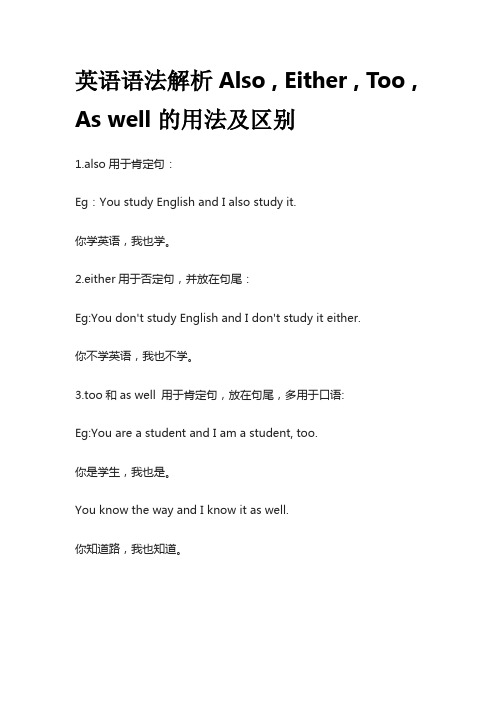
英语语法解析Also , Either , Too , As well的用法及区别1.also用于肯定句:Eg:You study English and I also study it.你学英语,我也学。
2.either用于否定句,并放在句尾:Eg:You don't study English and I don't study it either.你不学英语,我也不学。
3.too和as well 用于肯定句,放在句尾,多用于口语:Eg:You are a student and I am a student, too.你是学生,我也是。
You know the way and I know it as well.你知道路,我也知道。
#二.too和as well在口语中的使用频率要大于also,在also , too 和as well三者之中,also是比较正式的,书面语中比较多见。
而too和as well比较口语化一些。
否定句的时候,我们一般会使用either 放在句尾表示“也”,而不是使用too和also 。
Eg :1.Can you come too/as well?你也能来吗?2.I was soo busy I missed lunch and dinner as well.我太忙了以至于我忘记了吃午饭也忘记了吃晚饭。
3.I don't like grammar.我不喜欢语法。
4.I don't like it either.我也不喜欢。
#三.Also的用法1.also 比too 和as well 正式,一般也不用于否定句:Eg:She is young and beautiful, and also rich.她年轻漂亮,而且有钱.2.also 有时用于句首(其后通常有逗号),相当于连词and:Eg:Also, his mother was dead.再说,他母亲又过世了.3.我们经常把also 前置,来强调后面的观点:Eg:It’s very humid. Also, you can easily get sunburn.非常潮湿。
either和too和also和so的区别

either,too,also,so这四个词都是副词,都含有 也的意思,可是它们的具体含义和用法却有比较明显的区别。
只能用在否定句中,常常和否定词not连用,用来否定词组或句子,其含义表示 也不 ,在一般情况下只能放在句末来加强整个句子的语气。
例如: She isn t likely to agree,either.她也不会同意的。
won t be in and won t (be) either.格林先生不在,史密斯先生也不在.表示 也 还 而且 ,常表示与某人做同样的事,也常用于非正式语体或口语中。
too通常放在句末或单词、词组之后,其语气较轻。
在句子中,too用作插入语时,前后应用逗号隔开,此时too与also可以替换。
too放在句末,表示强调谓语或宾语,当too放在形容词、副词之前,其含义表示 太 过于 ,too的用法比also更多些。
如: He can sing and dance, too.他会唱歌,也会跳舞。
That skirt is abit too short forher daughter.那条裙子对她女儿而言是太短了点儿。
You,too,may have a try.你也可以试一试。
Too the children will find in the book a lot of interesting pictures. 孩子们还能在书里面看到许多有趣的图片。
They also work in the hospital.=They work in the hospital,too.他们也在医院工作.3.在书面语里,also比too较为正式,also的语气较强,它的含义是 而且......还表示 此外还 也等含义,有时 also也表示 同样地的含义。
在口语中,also可以和too替换使用,但是,要注意also和too在句子中的位置不同。
also和常用的副词在句子中的位置相同,一般放在实意动词之前或系动词之后,有时放在整个谓语动词之前,有时也放在句首或句末用来修饰整个句子。
also too either neither的区别
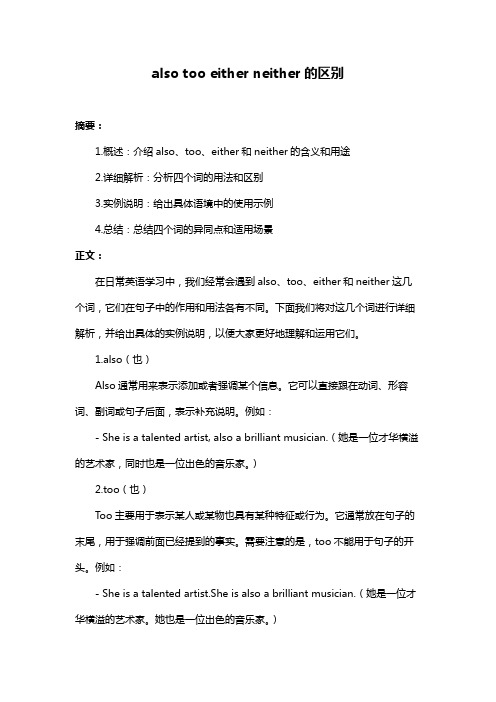
also too either neither的区别摘要:1.概述:介绍also、too、either和neither的含义和用途2.详细解析:分析四个词的用法和区别3.实例说明:给出具体语境中的使用示例4.总结:总结四个词的异同点和适用场景正文:在日常英语学习中,我们经常会遇到also、too、either和neither这几个词,它们在句子中的作用和用法各有不同。
下面我们将对这几个词进行详细解析,并给出具体的实例说明,以便大家更好地理解和运用它们。
1.also(也)Also通常用来表示添加或者强调某个信息。
它可以直接跟在动词、形容词、副词或句子后面,表示补充说明。
例如:- She is a talented artist, also a brilliant musician.(她是一位才华横溢的艺术家,同时也是一位出色的音乐家。
)2.too(也)Too主要用于表示某人或某物也具有某种特征或行为。
它通常放在句子的末尾,用于强调前面已经提到的事实。
需要注意的是,too不能用于句子的开头。
例如:- She is a talented artist.She is also a brilliant musician.(她是一位才华横溢的艺术家。
她也是一位出色的音乐家。
)3.either(either…or… )(要么…要么…)Either用于表示两个或多个事物中的一个。
它可以单独使用,表示“两者之一”,也可以和or连用,表示“要么…要么…”。
例如:- Please choose either red or blue color for the poster.(请选择红色或蓝色作为海报的颜色。
)4.neither(neither…nor… )(既不…也不…)either用于表示两个或多个事物都不是。
它常和nor连用,表示“既不…也不…”。
需要注意的是,neither不能单独使用。
例如:- She doesn"t like coffee nor tea.She prefers hot chocolate.(她不喜欢咖啡和茶。
also,too,either,aswell的区别

这四个副词均可表示“也”,区别如下:
1. too 和as well 多用于口语中,语气较轻,通常用于肯定句或疑问句,一般不用于否定句,且通常放在句末。
如:
I like you too [as well].
我也喜欢你。
Are they coming too [as well]?
他们也来吗?
too 有时也紧跟在主语后(注:as well 不这样用),此用法较正式。
如:I, too, know where he lives.
我也知道他住在什么地方。
在Me too, You too 这类简略答语中,通常不用as well, also。
如:
A:I’m tired. 我累了。
B:Me too. 我也是。
2. also 比too 和as well 正式,一般也不用于否定句,它在句中的位置通常是紧靠动词,即放在行为动词之前,特殊动词之后。
有时为了强调也放在句末(但不常见)。
如:
He also came. / He came also.
他也来了。
She is young and beautiful,and also rich.
她年轻漂亮,而且有钱。
also 有时用于句首(其后通常有逗号),相当于连词and。
如:
Also,his mother was dead.
再说,他母亲又过世了。
3. either(也)通常只用于否定句,且要放在句末。
如:
I don’t know, either.
我也不知道。
He hasn’t finished it,either.
他也还没有做完。
too
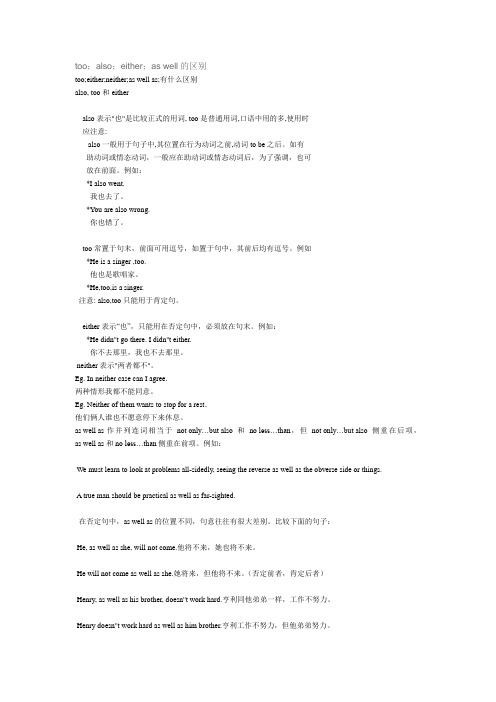
too;also;either;as well的区别too;either;neither;as well as;有什么区别also, too 和 eitheralso表示"也"是比较正式的用词, too 是普通用词,口语中用的多,使用时应注意:also 一般用于句子中,其位置在行为动词之前,动词to be之后。
如有助动词或情态动词,一般应在助动词或情态动词后,为了强调,也可放在前面。
例如:*I also went.我也去了。
*You are also wrong.你也错了。
too常置于句末,前面可用逗号,如置于句中,其前后均有逗号。
例如*He is a singer ,too.他也是歌唱家。
*He,too,is a singer.注意: also,too只能用于肯定句。
either 表示“也”,只能用在否定句中,必须放在句末。
例如:*He didn''t go there. I didn''t either.你不去那里,我也不去那里。
neither表示"两者都不"。
Eg. In neither case can I agree.两种情形我都不能同意。
Eg. Neither of them wants to stop for a rest.他们俩人谁也不愿意停下来休息。
as well as 作并列连词相当于not only…but also和no less…than,但not only…but also侧重在后项,as well as 和no less…than侧重在前项。
例如:We must learn to look at problems all-sidedly, seeing the reverse as well as the obverse side or things.A true man should be practical as well as far-sighted.在否定句中,as well as 的位置不同,句意往往有很大差别。
either和too和also和so的区别
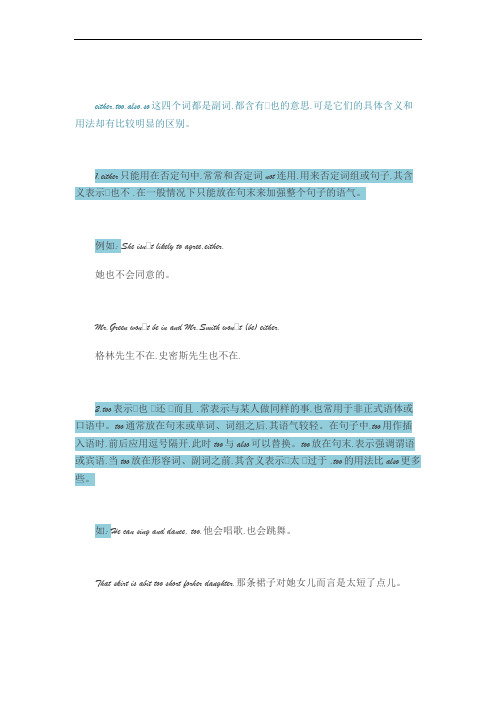
either,too,also,so这四个词都是副词,都含有 也的意思,可是它们的具体含义和用法却有比较明显的区别。
1.either只能用在否定句中,常常和否定词not连用,用来否定词组或句子,其含义表示 也不 ,在一般情况下只能放在句末来加强整个句子的语气。
例如: She isn t likely to agree,either.她也不会同意的。
Mr.Green won t be in and Mr.Smith won t (be) either.格林先生不在,史密斯先生也不在.2.too表示 也 还 而且 ,常表示与某人做同样的事,也常用于非正式语体或口语中。
too通常放在句末或单词、词组之后,其语气较轻。
在句子中,too用作插入语时,前后应用逗号隔开,此时too与also可以替换。
too放在句末,表示强调谓语或宾语,当too放在形容词、副词之前,其含义表示 太 过于 ,too的用法比also更多些。
如: He can sing and dance, too.他会唱歌,也会跳舞。
That skirt is abit too short forher daughter.那条裙子对她女儿而言是太短了点儿。
You,too,may have a try.你也可以试一试。
Too the children will find in the book a lot of interesting pictures. 孩子们还能在书里面看到许多有趣的图片。
They also work in the hospital.=They work in the hospital,too.他们也在医院工作.3.在书面语里,also比too较为正式,also的语气较强,它的含义是 而且......还表示 此外还 也等含义,有时 also也表示 同样地的含义。
在口语中,also可以和too替换使用,但是,要注意also和too在句子中的位置不同。
- 1、下载文档前请自行甄别文档内容的完整性,平台不提供额外的编辑、内容补充、找答案等附加服务。
- 2、"仅部分预览"的文档,不可在线预览部分如存在完整性等问题,可反馈申请退款(可完整预览的文档不适用该条件!)。
- 3、如文档侵犯您的权益,请联系客服反馈,我们会尽快为您处理(人工客服工作时间:9:00-18:30)。
either,too,also,so这四个词都是副词,都含有 也的意思,可是它们的具体含义和用法却有比较明显的区别。
只能用在否定句中,常常和否定词not连用,用来否定词组或句子,其含义表示 也不 ,在一般情况下只能放在句末来加强整个句子的语气。
例如: She isn t likely to agree,either.
她也不会同意的。
won t be in and won t (be) either.
格林先生不在,史密斯先生也不在.
表示 也 还 而且 ,常表示与某人做同样的事,也常用于非正式语体或口语中。
too通常放在句末或单词、词组之后,其语气较轻。
在句子中,too用作插入语时,前后应用逗号隔开,此时too与also可以替换。
too放在句末,表示强调谓语或宾语,当too放在形容词、副词之前,其含义表示 太 过于 ,too 的用法比also更多些。
如: He can sing and dance, too.他会唱歌,也会跳舞。
That skirt is abit too short forher daughter.那条裙子对她女儿而言是太短了点儿。
You,too,may have a try.你也可以试一试。
Too the children will find in the book a lot of interesting pictures. 孩子们还能在书里面看到许多有趣的图片。
They also work in the hospital.=They work in the hospital,too.他们也在医院工作.
3.在书面语里,also比too较为正式,also的语气较强,它的含义是 而且......还表示 此外还 也等含义,有时 also也表示 同样地的含义。
在口语中,also可以和too替换使用,但是,要注意also和too在句子中的位置不同。
also和常用的副词在句子中的位置相同,一般放在实意动词之前或系动词之后,有时放在整个谓语动词之前,有时也放在句首或句末用来修饰整个句子。
如: She also is reading along story.她也正在看长篇小说。
has also gone to Tianjin to work.史密斯先生也去天津工作了。
表示 (!!也)同样,(!!亦)如此等含义。
在简短表达的句子中,也可以使用so的结构。
一般情况下,当谈及两人或两件事时,若在肯定地谈到一方时,再说对方的情况也如此,或也是同样的,则习惯上用so之后接be或have或do或情态动词再接 主语的结构。
而事实上,这是一种倒装结构,通常用于肯定句中加强语气。
如: They like making machines and so do we.他们喜欢制造机器,我们也喜欢。
当so作副词时,其意思是 那么 这么 多么。
如: Don t run so fast I can t catch up you. 别跑得那么快,我赶不上。
当so作形容词表示 真的 事实上如此的意思时,
如: Is it so you are reading an English book你真的在看英语书吗
当so作感叹词时,它的含义是 (惊讶)啊 哦。
如: So,she has gone to school without a word again. 哦,她又一句话没说就上学去了。
